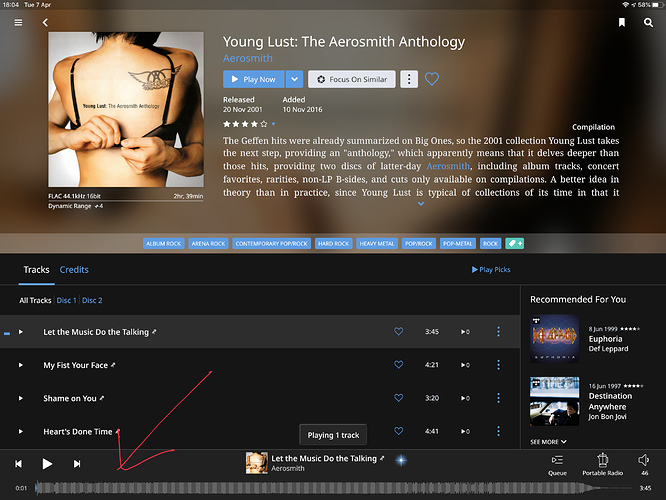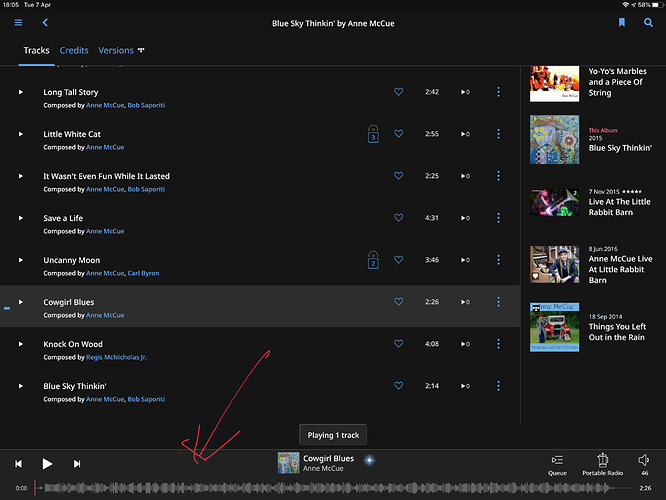In other words, Masters audio is just them raising the pre-gain by 6db. That’s all music these days.
Sorry - don’t understand… who are ‘them’?
Whoever is adjusting the tracks.
That’s what I’m asking. Who do you think is doing the ‘adjusting’?
You’ll see it in the progress bar for Roon with albums in your personal library
Not great
Much better.
Just a couple of quick examples
Well. Yes. Obviously. I was hoping Daniel could point me to a track that was actually audibly different on (say) Tidal than (say) Qobuz…
My experience so far is that if they sound (or, indeed, measure) different, it’s a different (re)master. I’d like to see an example where it’s not.
I didn’t keep a log of my tests. The tests stretched over several days, and I chose tracks at random.
You don’t need a specific track. Simply choose 10 tracks from your library, with different artists and genres, and have FLAC + TIDAL + QOBUZ, and with the same mastering. You will see differences in all or almost all tracks.
This is a general problem, it is not specific to certain and few tracks…
Or do whatever tests you want and see if you reach the same conclusion as me.
Just find the master that sounds best. That’s all you can do, let your ears decide. Highly compressed music always sound rubbish on good equipment in my experience.
I don’t know what app you used but these very low frequency rates are actually for telephony applications and may well have been provided by your app with those applications in mind. Things like MoH (Music on Hold) or IVR (Interactive Voice Recording).
If that really does sound better than the youtube downloads then maybe the hardware is the limiting factor? On the road I like to play roon through inexpensive hotel TV’s and I will get distortion if I turn it up too loud. Not a problem as I cannot turn it up too loud anyway. To get the undisstorted sound you are after is probably going to need upgrades all through the chain. Speakers, amp, dac, music player, music files.
The good folks at Tidal or Quboz?
Some iOS app that claims to play hifi quality. Like I said, it could’ve been a placebo effect.
Out of curiosity, I used dbPoweramp to drastically downsample like you. It sounded muffled, truely awful on my main system but with some earbuds through my laptop I could certainly turn it up much louder than I can normally bear. No top end but I cannot hear anything much above 11khz anyway. But at least I got the energy and excitement.
Check this out. https://www.quora.com/Can-you-hear-the-difference-in-quality-between-24bit-and-32bit-192khz-music-files
Those are all very high quality to varying degrees. Many here accept that it is a long time since they were able to hear the difference (a function of the aging process). The ones you mentioned in your opening post you have compressed to the limitations of telephone technology of half a century ago. That’s very different. I think most people here will notice the difference.
I know, which is why I posed the question. I’m still trying to learn all this audio stuff.
This completely ignores what the extra bit-depth does to filters (including dither) and how that filtering impacts the audible range (distortion specifically). There are plenty of studies and testing which shows that a larger bit-depth improves the sound quality within the audible range. All PCM must be run through filters so this is very relevant part of bit-depth understanding when doing PCM encoding. Most DAWs will work in 24 or 32-bit. It requires a dither operation to convert that to 16bits. That operation may be audible. It’s not just about dynamic range with regard to bit-depth.
I already did. And if the levels are matched, and the mastering is identical, they sound the same. Which is why I was hoping you could point me to a case where they were not. Oh well.
My understanding is that Tidal and Qobuz stream the data they are provided with by the distributors, and don’t process it except to normalise loudness within their respective apps when that functionality is turned on. The stream to Roon is not normalised, but does include R128 loudness metadata to enable Roon to apply loudness normalisation to your chosen level if you enable it.
Why does one need Roon if they have Tidal or Quboz? What benefits does Roon bring that those streaming services cannot?
There’s probably 10 threads stating the benefits of Roon with and without streaming Tidal and/or Qobuz.

